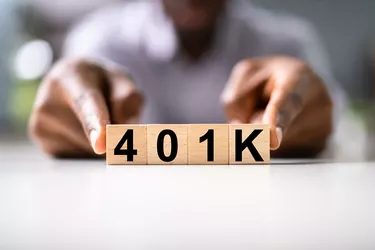
Borrowing from your 401(k) allows you to tap your retirement savings early without income tax consequences -- as long as you repay the loan on time. A 401(k) must be repaid in full over no more than five years, unless you're borrowing to buy your main home. In that case, your plan sets the maximum repayment term.
Repayment Through Payroll Deductions
Video of the Day
Your 401(k) plan sets the specifics for calculating your interest rate and payment amounts for your loan. These payments are made by taking money out of your paychecks. For example, if your monthly payment is $150 and your take home pay is usually $2,300, your checks will drop to $2,150 when you're paying back the loan. The repayments taken from your paycheck aren't tax deductible because you're repaying a loan from your 401(k) plan, not making additional contributions.
Video of the Day
Other Repayment Methods
You may also repay your 401(k) plan with regular payments you make on your own, rather than through payroll deductions. Your 401(k) plan administrator will provide you with details on how often the payments must be made and where you need to send the money. For example, TIAA-CREF allows you to select either monthly or quarterly repayments. However, all loans require at least quarterly payments. Some administrators allow you to set up automatic debits to your bank account so that the payments are automatically withdrawn. That way, you don't default on your loan because you forgot to mail in your check one month.
Suspensions of Repayments
The IRS does permit a 401(k) plan to allow you to suspend your payments on your 401(k) loan in limited circumstances. First, your plan might allow you stop making payments while you are performing military service. Second, if you take a leave of absence from your job, you can suspend your repayments for up to one year while you aren't working. However, when you return, you must either make larger payments over the remainder of the loan term or make a lump-sum payment at the end so that the loan is still paid off in full by the original last payment.
Early Repayment
In some circumstances, you may want or need to pay off your 401(k) loan ahead of schedule. For example, you might want to make an extra payment, or pay off the loan entirely, if you have a sudden financial windfall and you don't want to miss out on market gains because your 401(k) funds have been lent to you rather than being invested in the market. Alternatively, if you leave your job, whether it's by choice or not, you must repay the loan in full, typically within two months of leaving. To do so, contact the financial institution that manages your 401(k) plan. It can tell you the exact amount you need to write a check for, what to put on the check so it's credited correctly, and where to send the check.
Consequences of Default
If you default on your 401(k) loan, the plan treats it as though you took a distribution of the remaining balance due. For example, say you borrowed $30,000 and you repaid the balance down to $12,000 before defaulting on the loan. You'll be treated as having taken out $12,000 from your 401(k) plan, which results in taxable income. In addition, if you're under 59 1/2 years old, you'll owe a 10 percent early withdrawal penalty on top of the income taxes.
- IRS.gov: Retirement Plans FAQs Regarding Loans
- TurboTax: Tax Consequences When You Have a 401(k) Loan and Quit or Lose Your Job
- My Retirement Program: How to Pay your 403(b)/401(k) Loan Off Early
- IRS.gov: Topic 558 -- Additional Tax on Early Distributions from Retirement Plans Other Than IRAs
- TIAA-CREF: Loans